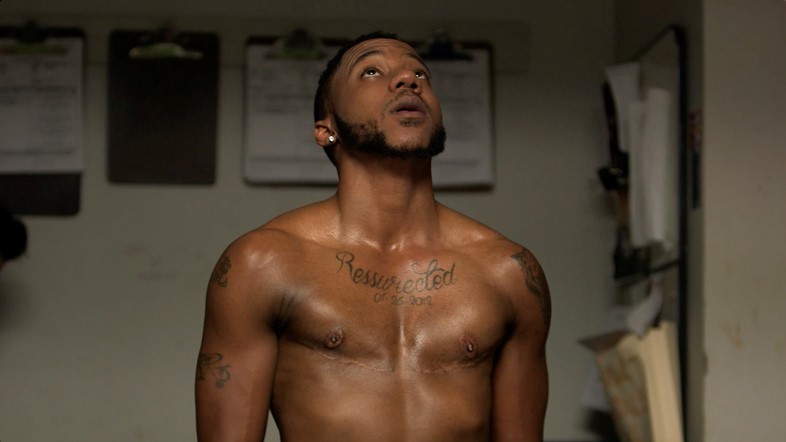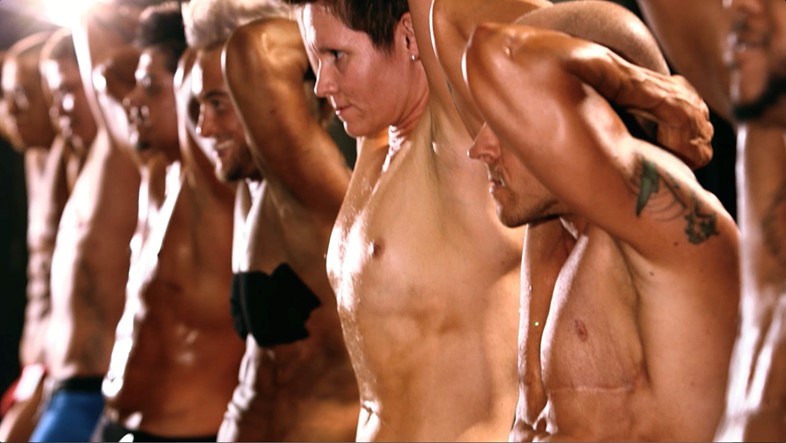T Cooper tells Another Man about his directorial debut, Man Made – a documentary about the world’s only all-transgender bodybuilding competition, Trans FitCon
- TextZoe Whitfield
Man Made is a new documentary about Trans FitCon, the only all-transgender bodybuilding competition in the world, as we’re told in the documentary’s opening segment, while Cooper’s camera follows four men as they prepare for, and ultimately compete in, this unique physical showcase.
“I wanted to be a lens,” says director T Cooper, via a WhatsApp call from Atlanta. “To observe, to be faithful and honest and quiet, to listen and watch and, when asked, take part.” A journalist, author of several novels and TV writer/producer for shows on Netflix, NBC and BBC America, Cooper did exactly that with this documentary, which represents his directorial debut.
Shot over a year and a half, the film’s subjects allows Cooper – and by extension the audience – to witness extemely personal, and at times heartbreaking moments in their lives: from meeting family members for the first time, to dealing with homelessness and navigating mental health issues. Indeed, as Cooper explains with a warm, matter-of-fact tone, the competition itself is foremost a cinematic framework. “A multi-subject sports doc that’s competition-based,” he offers, “that’s familiar to people and it gives you something to root for.”
Despite its more sombre scenes, Man Made is ultimately a celebratory portrait: in the documentary Cooper, a trans man himself, highlights narratives too infrequently entertained by more mainstream channels, a common reality that fundamentally informed his casting of Mason, Rese, Dominic and Kennie as the film’s leading voices.
Debuted in 2018 and since screened at over 80 film festivals worldwide, now, as the film arrives on DVD and across VOD platforms, Cooper tells us more about turning filmmaker for the first time.

Zoe Whitfield: What first led you to the competition?
T Cooper: I came to Atlanta in 2015 and saw a picture of the first Trans FitCon – a very different affair from what you see in the film, just a few guys on stage in a bar downtown. I was struck immediately by how amazing the images were and how beautiful it was, all these guys from different places, all being celebrated at this competition. My impulse was to write about it, but when I started meeting people it became apparent that a 2000-word story wasn’t going to do it justice. I’d never made a documentary but I figured out how to beg, borrow, steal and operate a camera, so I could start chronicling a full three-dimensional view of their lives.
ZW: Prior to Man Made, what was your relationship to body building?
TC: What’s weird is that I grew up in LA going to the mecca of bodybuilding on Venice Beach. As a young person, who would be a trans person eventually, that sculpting and presentation of masculinity was always interesting – fascinating really – and I spent a lot of time watching the guys at Muscle Beach.
ZW: And for the film?
TC: The subject matter lends itself so beautifully, the metaphor of bodybuilding. To me it’s about way more than being trans, it’s about how we all, as humans, pack experiences onto our lives and our bodies that make us who we are. It underscores how we change from the minute we’re born to the minute we leave. I’m not a body builder but I think we all are in some way.

ZW: How did you decide on the casting?
TC: As a trans man, I don’t see our stories told so, if I was going to tell that story, I wanted guys of different races, ages, sizes, geography, levels of acceptance, stages of transition... In trans storytelling, especially in trans storytelling that’s not made by trans people, the focus tends to be on our transition – or worse – so it was really important to show this 360-degree view of our lives. Yes, they all share this one identity, but we’re way more than our transitions or the bad things. I wanted to provide a cross section for people who are not super familiar with trans men, much less trans men of colour, to get a feel of where we are as a community at this particular cultural moment.
ZW: How did the guys react to the project initially?
TC: We’ve been touring festivals, and what’s been really cool is that everyone has said ‘I don’t think I would have done this if T wasn’t making it’ – someone who is a trans male and coming from a similar background. I didn’t push, I just was like ‘this is what I’m trying to do’, be faithful in telling the richness of our lives and not make it a prurient look into transition, which unfortunately a lot of trans storytelling still is. So everyone knew and they were like ‘let’s do it’. They opened their lives to me. They were so generous, that’s one thing I’m constantly humbled by. It was just magic.
ZW: Your own story isn’t explicitly told, but it’s definitely present. Was that intentional?
TC: It was organic. I had a cut with zero of me in it and people said ‘where are you’ and I was like, ‘what do you mean I’m all over this’ and they were like, ‘no you weren’t. We know you’re there but for an audience...’ There’s these organic moments that, if it were not a trans director, wouldn’t have happened – I wouldn’t be pulling down Dom’s binder, or helping DJ load a shot for Kennie. They showed that these are my stories as well. There was a real trust and intimacy that built up, and it felt weird not to include it.
ZW: You mentioned touring the film. What have been your highlights?
TC: Honestly just engaging with audiences, especially people who never even considered these lives existed. Hearing from not only trans men – who would come up with tears in their eyes – from those super-specific experiences, to cisgender heterosexual white, pretty privileged people who are just like ‘holy crap, there were so many things in there I really related to’. Really the universality which was what I wanted. It’s humbling, to be able to play in Hong Kong, Scandinavia, the UK… And so many places where I don’t know how we got past the censors, like Myanmar. The fact that people – especially trans guys – could see themselves, it’s just so cool.











